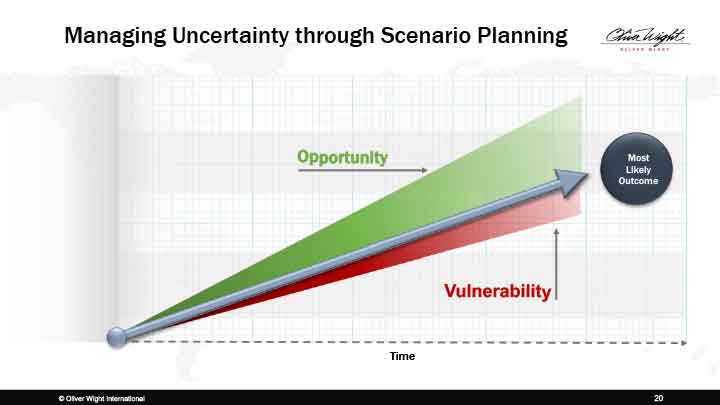What is scenario planning and why is it so important?
14 Jun 2021
Blog

It has certainly been an interesting time to be alive! Whilst we have all become used to change being the norm, the amount of change that has occurred over the last 18 months goes well beyond any type of ‘norm’. Volatility in so many of my clients is running high, and it can be very challenging to know how best to manage this when it is hard to know exactly what is happening.
The pandemic has impacted consumer habits massively, with swings from bricks and mortar to online, eating and drinking in vs eating and drinking out, antibacterial and sanitisation products being in very high demand, consumers’ willingness to ‘treat’ themselves in the home driving high end luxury purchases, house price increases and house sales driving household purchases to soar to new heights. These consumer changes are causing a bullwhip effect through many supply chains, and the consequences are being felt far and wide.
Many of my clients are now asking how they can plan effectively with this constant volatility and uncertainty. Statistical modelling of old is certainly of significantly less value than it was before, and the need to think and plan differently is more important than ever.
So, what is the answer?
I have been helping a lot of my clients with utilisation of ‘scenario planning’. This dynamic approach to managing uncertainty is giving a competitive edge to those who do it effectively, enabling planning and decision making to thrive and business success to be achieved.
To be able to scenario plan, there must be a base plan that is already in place. Integrated Business Planning (IBP) is a core foundation to enable scenario planning to take place.
IBP enables an organisation to create and develop an integrated plan around a common set of assumptions and plans. The integration and alignment of these plans and assumptions means the business is able to create a ‘One Set of Numbers’ approach to the future – developing a firm foundation to then determine how to respond to uncertainty. Without this core base around the ‘Most Likely Outcome’ it is not possible to scenario plan around it.
Planning a response to uncertainty
Once an organisation has established the ‘Most Likely Outcome’ then they can start to identify and manage those areas where uncertainty exists. These are called ‘Opportunities’ and ‘Vulnerabilities’.
These are captured from across the entire organisation, covering:
- Product introduction uncertainties
- Demand/consumer purchasing uncertainties
- Supply chain uncertainties
- Financial uncertainties
- HR uncertainties
- Legal uncertainties
- Regulatory uncertainties

The formal capturing of uncertainty around the integrated base plan enables organisations to then develop scenarios that can be modelled within the business to determine how they will respond if any of those uncertainties do occur.
It is important to remember that uncertainty can be a positive for a business, especially if they are ready with how they will deal with it.
I was with a client a few weeks ago who managed to utilise their scenario planning to win a significant piece of new business, driven by the fact they had already created a ‘scenario’ of how they would respond. They had identified an opportunity through their IBP process around a key competitor going out of business and had spent time as part of their ‘opportunity management’ to create a scenario of how they would respond. This included the holding of some strategic safety stock of raw materials, and also some finished goods.
This scenario planning meant that when the competitor did go out of business, they were able to take on the contract to supply rapidly – the key factor in awarding them the new piece of business. They recognised that had they not had a scenario plan in place they would not have been able to respond within the required timelines and would likely have not won the new business.
Whilst the outcome here was positive, a key factor to remember when making scenario plans is to think through how can we ensure we do not end up being left with any excess inventory if we do not win the new piece of work. For this business they had already agreed how they would ‘unwind’ their inventory build-up if the Opportunity did not occur (the bankruptcy of their competitor was not guaranteed) and over what time period – again aligned across the organisation and a key element of the ‘scenario’ developed.
For scenario planning to work effectively, there is a need for a robust capability to capture those upsides (Opportunities) and downsides (Vulnerabilities) so that the various scenarios can be managed. Rarely is a scenario a single dimensional consideration, instead it is a multi-functional and multi-faceted business response to uncertainty.
As such, scenario planning is a key requirement of the Integrated Reconciliation Team as these individuals have the broadest view of organisational uncertainty and can develop the scenarios in a true team approach.
The role of tools
Over recent years the ability to scenario plan has improved significantly as tool providers have seen this as a capability their customers want.
I have certainly seen a move away from scenarios being done in several off-line excel spreadsheets to an integrated scenario model in one of many available tools. The advancement of tools helps to speed up scenario planning and also the development of the financial consequences of the decisions made. Integrated and rapid decision support capability is really driving significant opportunities in this area.
How good is your ability to respond to uncertainty?
Are you able to beat your competition because of it, or are you at risk that your competition will beat you because of your lack of it?
The need for a robust and mature Integrated Business Planning process is a critical foundation if you are to succeed in this area. Many companies are now working to develop this core capability, and the tools to support this continue to advance.
My belief is that uncertainty is going to be with us for a long time to come, in fact uncertainty is probably a constant! So make sure you are able to thrive with uncertainty, set yourself up for success, and don’t be left behind.
Download our white paper, Scenario Planning: A necessary skill to drive better decision making in IBP to learn more.
Author(s)
-
